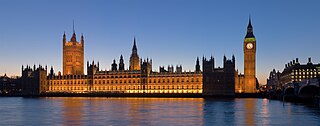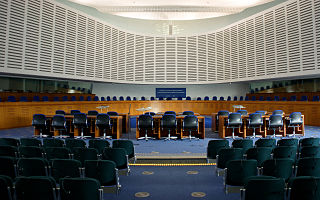
The European Convention on Human Rights is an international convention to protect human rights and political freedoms in Europe. Drafted in 1950 by the then newly formed Council of Europe, the convention entered into force on 3 September 1953. All Council of Europe member states are party to the Convention and new members are expected to ratify the convention at the earliest opportunity.
The Anti-terrorism, Crime and Security Act 2001 is an Act of Parliament of the United Kingdom, formally introduced into Parliament on 19 November 2001, two months after the terrorist attacks in the United States on 11 September. It received royal assent and came into force on 14 December 2001. Many of its measures are not specifically related to terrorism, and a Parliamentary committee was critical of the swift timetable for such a long bill including non-emergency measures.
The Prevention of Terrorism Act 2005 was an Act of the Parliament of the United Kingdom, intended to deal with the Law Lords' ruling of 16 December 2004 that the detention without trial of eight foreigners at HM Prison Belmarsh under Part 4 of the Anti-terrorism, Crime and Security Act 2001 was unlawful, being incompatible with European human rights laws.

Human rights in the United Kingdom concern the fundamental rights in law of every person in the United Kingdom. An integral part of the UK constitution, human rights derive from common law, from statutes such as Magna Carta, the Bill of Rights 1689 and the Human Rights Act 1998, from membership of the Council of Europe, and from international law.

A and others v Secretary of State for the Home Department[2004] UKHL 56 is a UK human rights case heard before the House of Lords. It held that the indefinite detention of foreign prisoners in Belmarsh without trial under section 23 of the Anti-terrorism, Crime and Security Act 2001 was incompatible with the European Convention on Human Rights.
Evans v. the United Kingdom was a key case at the European Court of Human Rights. The case outcome could have had a major impact on fertility law, not only within the United Kingdom but also the other Council of Europe countries.
Soering v United Kingdom 161 Eur. Ct. H.R. (1989) is a landmark judgment of the European Court of Human Rights (ECtHR) which established that extradition of a German national to the United States to face charges of capital murder violated Article 3 of the European Convention on Human Rights (ECHR) guaranteeing the right against inhuman and degrading treatment. In addition to the precedence established by the judgment, the judgment specifically resulted in the United States committing to not seek the death penalty against the German national involved in the case, and he was eventually extradited to the United States.

United Kingdom administrative law is part of UK constitutional law that is designed through judicial review to hold executive power and public bodies accountable under the law. A person can apply to the High Court to challenge a public body's decision if they have a "sufficient interest", within three months of the grounds of the cause of action becoming known. By contrast, claims against public bodies in tort or contract are usually limited by the Limitation Act 1980 to a period of 6 years. Almost any public body, or private bodies exercising public functions, can be the target of judicial review, including a government department, a local council, any Minister, the Prime Minister, or any other body that is created by law. The only public body whose decisions cannot be reviewed is Parliament, when it passes an Act. Otherwise, a claimant can argue that a public body's decision was unlawful in five main types of case: (1) it exceeded the lawful power of the body, used its power for an improper purpose, or acted unreasonably, (2) it violated a legitimate expectation, (3) failed to exercise relevant and independent judgement, (4) exhibited bias or a conflict of interest, or failed to give a fair hearing, and (5) violated a human right. As a remedy, a claimant can ask for the public body's decisions to be declared void and quashed, or it could ask for an order to make the body do something, or prevent the body from acting unlawfully. A court may also declare the parties' rights and duties, give an injunction, or compensation could also be payable in tort or contract.
Article 8 of the European Convention on Human Rights provides a right to respect for one's "private and family life, his home and his correspondence", subject to certain restrictions that are "in accordance with law" and "necessary in a democratic society". The European Convention on Human Rights (ECHR) is an international treaty to protect human rights and fundamental freedoms in Europe.
Article 3 of the European Convention on Human Rights prohibits torture, and "inhuman or degrading treatment or punishment".
Article 3 – Prohibition of torture No one shall be subjected to torture or to inhuman or degrading treatment or punishment.

R (Carson) v Secretary of State for Work and Pensions and R v Secretary of State for Work and Pensions were a series of civil action court cases seeking judicial review of the British government's policies under the Human Rights Act 1998. They related to the right to property under Article 1 of the First Protocol and prohibition of discrimination under Article 14 of the convention. In Reynolds's case, there was also Article 8 of the European Convention on Human Rights (ECHR), the right to respect for "private and family life" to be considered, as well as Article 3 of the ECHR, the prohibition of torture, and "inhuman or degrading treatment or punishment".

Wilson v United Kingdom [2002] ECHR 552 is a UK labour law and European labour law case concerning discrimination by employers against their workers who join and take action through trade unions. After a long series of appeals through the UK court system, the European Court of Human Rights held that ECHR article 11 protects the fundamental right of people to join a trade union, engage in union related activities and take action as a last resort to protect their interests.
Chahal v. United Kingdom was a 1996 judgment of the European Court of Human Rights which applied Article 3 of the European Convention on Human Rights, prohibiting the deportation of Sikh separatist Mr Chahal to India because of the risk of violations of Article 3, in the form of torture or inhuman or degrading treatment or punishment.
The right to family life is the right of all individuals to have their established family life respected, and to have and maintain family relationships. This right is recognised in a variety of international human rights instruments, including Article 16 of the Universal Declaration of Human Rights, Article 23 of the International Covenant on Civil and Political Rights, and Article 8 of the European Convention on Human Rights.
Copland v United Kingdom [2007] ECHR 253 is an ECHR case about UK labour law, English contract law case and health care in the UK.
Saadi v Italy was a case of the European Court of Human Rights (ECtHR) decided in February 2008, in which the Court unanimously reaffirmed and extended principles established in Chahal v United Kingdom regarding the absolute nature of the principle of non-refoulement and the obligations of a state under Article 3 of the European Convention on Human Rights (ECHR).

R. v. Secretary of State for the Home Department was a case decided on 3 November 2005 by the UK House of Lords that determined whether or not a delay in initiating an application to seek asylum limited an individual from receiving access to state relief. Furthermore, the case questioned whether this denial of state relief constituted a breach of the European Convention on Human Rights 1950 ('ECHR').

R (Carson) v Secretary of State for Work and Pensions [2005] UKHL 37 was heard by the Lords of Appeal in the House of Lords on 26 May 2005 before Lord Nicholls, Lord Hoffmann, Lord Rodger, Lord Walker, and Lord Carswell.

Carson and Others v. The United Kingdom [2008] ECHR 1194 was heard by the European Court of Human Rights (ECHR), Fourth Section in Strasbourg on 4 November 2008 appeal from the Appellate Committee of the House of Lords before Lech Garlicki (President); Nicolas Bratza; Giovanni Bonello; Ljiljana Mijović; David Thór Björgvinsson; Ledi Bianku; Mihai Poalelungi.
A. and Others v United Kingdom is a human rights case decided by the European Court of Human Rights. It unanimously held that holding prisoners indefinitely under the Anti-terrorism, Crime and Security Act 2001 was incompatible with Article 5.








